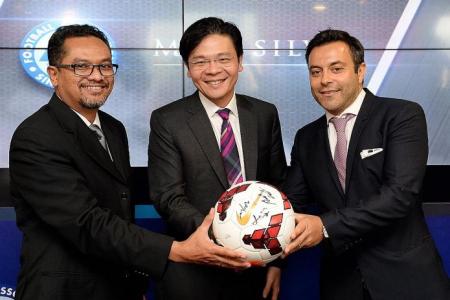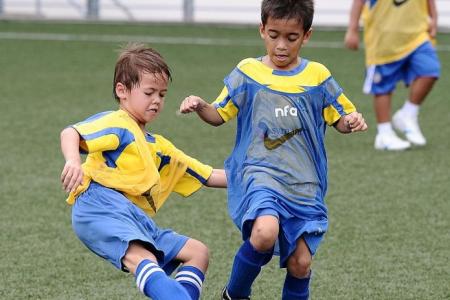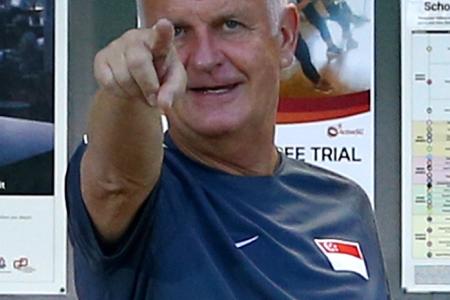A review of FAS' Strategic Plan
Review of FAS' strategic plan reveals some high points and areas to work on
The national football team hit their target of six points when they won their two recent World Cup/Asian Cup qualifying matches on home soil.
The two results kept alive the Lions' hopes of qualifying for the 2019 Asian Cup Finals in the United Arab Emirates for the first time.
But the performance of Bernd Stange's team drew much criticism, with the lack of attacking flair in the side drawing the most flak.
Singapore have won four Asean titles - in 1998, 2004, 2007 and 2012 - but the Lions were poor when they defended their crown on home soil last year as they exited the competition in the group stage.
The embarrassing performance of the Under-23s in June's South-east Asia Games here was quickly followed by the national team's stunning showing in Saitama when they held Japan 0-0 in a World Cup qualifier.
This has been the up-and-down scenario of the local game since the Football Association of Singapore (FAS) announced its five-year Strategic Plan in 2010.
Admittedly, the association's annual budget of $9.8 million pales in comparison to regional governing bodies.
According to 2012 figures, Japan ($264 million), China ($180 million), Indonesia ($112 million) and Malaysia ($35 million) all have deeper pockets.
With the FAS about to embark on a new multi-year plan, The New Paper looks at the performance of each of the pillars of the 2010 blueprint.
COMPETITIONS
One of the pillars of the strategic plan was to enhance the local football calendar.
The revival of the Lion City Cup youth tournament in 2011 was a success, and age-group teams from Ajax Amsterdam (Holland), Juventus (Italy) and Arsenal (England) provided quality opposition for local boys to test themselves.
Although the tournament was not held in 2014, partly because of funding issues, it returned this year and promises to be bigger and better next year.
This year also saw the first edition of the Barclays Trophy Tour, where a Singapore Selection side coached by V Sundramoorthy got the chance to mix it with the stars from English sides Arsenal, Everton and Stoke City.
The FAS has also been a key driver of the Asean Super League, which is slated to kick off in 2017.
The proposed elite club competition could propel football in the region to new heights.
The FAS is also exploring a bid for the 2019 Under-17 World Cup.
FOOTBALL BUSINESS
The FAS scored a major coup when it signed a $25 million, six-year deal with international sports media rights company MP & Silva in February.
It is the biggest commercial partnership for the FAS, eclipsing the $15 million, 10-year deal signed in 2001 with Tiger Beer. It is also the biggest sponsorship deal for any national sports association.
MP & Silva, an Italian-based company, hold the global media rights for Singapore's national and age-group teams as well as the sponsorship rights. They are also tasked to secure international events for the Lions and the various national age-group squads.
The FAS has also managed to secure new sponsors like AirAsia, Epson, SilkAir and Silkpro, among others.
YOUTH DEVELOPMENT
The Junior Centre of Excellence (JCOE) system (left) was introduced in 2011 for Under-8s, U-10s and U-12s, as the FAS sought to reach out to more young talent.
A National Football Syllabus was developed by then-technical director, Slobodan Pavkovic.
However, the fact national age-group teams still fell short in regional qualifying matches recently suggests there is much more work ahead.
The FAS has stepped up its youth development effort over the last six months.
The appointment of Michel Sablon, the mastermind behind the blueprint that has produced a "golden generation" of footballers in Belgium like Eden Hazard and Vincent Kompany, and propelled the country to No. 1 in Fifa's rankings, is regarded a major coup.
The FAS followed that up by bringing in Frenchman Richard Tardy, who coached Rwanda to the Under-17 World Cup, and goalkeeping guru Guy Martens, who mentored Chelsea star and current Belgium No. 1 Thibaut Courtois while he was at Genk.
The Cubs Programme, an initiative aimed at increasing football participation at grassroots level in a bid to widen and the base of local footballers, was also launched.
SPORTS SCIENCE AND MEDICINE
FAS first implemented GPS heart-rate monitoring for the senior national team during preparations for last December's AFF Suzuki Cup.
A series of regular tests for endurance, speed, hydration and body fat has also been introduced for senior and age-group teams before competitions.
The FAS has also beefed up its team by employing strength and conditioning coach Matthew Jones, who was previously at Cardiff City.
Senior physiotherapist Nurhafizah Sujad has attended Fifa medical courses in London and Milan over the last two years.
Speaking to TNP recently, Sablon revealed how impressed he was with both the personnel and programmes of the department.
NATIONAL TEAMS
The senior national team lifted a joint-record fourth AFF Suzuki Cup triumph - along with Thailand - in December 2012, but have had little to shout about since.
Serb Radojko Avramovic left when his contract ended following the Asean title triumph and was replaced by Stange (left) in May 2013.
The former Iraq and Belarus coach said he wanted his Lions to play a pass-and-move brand of football, but the national team continue to struggle to sustain the style for 90 minutes. His team were also dumped out of the AFF Suzuki Cup in the group stage last December, despite playing on home soil.
The Under-23 team suffered the same fate six months later, crashing out of the 2015 SEA Games, which Singapore hosted for the first time in 22 years.
The team had won a bronze medal at the 2013 SEA Games.
Still, there is some hope ahead.
Better-than-expected results in the ongoing World Cup/Asian Cup qualifying matches have put Singapore in a position to qualify for the continent's biggest tournament for the first time.
FACILITIES
The building of a National Training Centre, first mooted in 2010, looks like a genuine possibility today.
TNP understands the state-of-the-art training hub will be located either at the current Kallang Cricket Field ground, or in Taman Jurong.
The facility, which could be completed in 2018, is estimated to cost $25 million.
It is understood to be part of the FAS facilities masterplan, which includes four regional training centres and five football-specific stadiums.
One facility that already undergone a transformation is Geylang Field, which serves mainly as the training venue for the senior national team.
Previously featuring a cramped changing room and a container that served as a meeting room, as well as a shoddy pitch, a facelift completed at the start of the year saw the venue re-turfed with a quality surface, and is now accompanied by quality support facilities including a gym.
LEADERSHIP & MANAGEMENT
In 2012, the FAS was ranked as one of the top national sports associations in Singapore, in a report by national body Sport Singapore.
TSE Consulting, an independent international consulting firm appointed by Sport Singapore, also noted the association's "well-rounded strategic initiatives plan built into the multi-year sports plan".
The FAS has also regularly received endorsements from world and regional governing bodies like Fifa and the Asian Football Confederation (AFC). It's management staff have also been recognised internationally.
FAS vice-president Lim Kia Tong was appointed deputy chairman of Fifa's disciplinary committee for the 2014 World Cup, while general secretary Winston Lee was elected as one of the AFC's five vice-presidents in April.
INFORMATION TECHNOLOGY
Singapore was selected to be the first country to undertake the Fifa Connect Programme, a worldwide football registration programme to help organise players, referees and match officials from around the globe.
The establishment of this computerised system allows for the exchange of data across national borders, theoretically making issues such as compensation fees for transfer of players quicker and smoother.
Finland and Hong Kong have since followed suit.
What they say

KOHZO TASHIMA
Japan Football Association vice-president and Fifa Executive Committee member (above)
The FAS has a strong vision and has progressed well in key areas over the past few years.
These include recognition of its strengths in leadership and management and the development of its youth players - many of whom have begun to catch the attention of international teams, including European clubs.
Success is, to a large extent, dependent on strong leadership and this is one of the areas where the management capability of FAS is widely respected in the international football fraternity.
The FAS, which has a small budget, has achieved a lot in recent years.
There is much potential for Singapore football to progress further but this is possible only if the FAS succeeds in obtaining the required amount of resources and support.
All key partners involved in the sport need to come together and resolve the challenges
Otherwise, you will never be able to realise the full potential.

S THAVANESON
Chairman of S.League club Balestier Khalsa (above)
There is a clear direction but the journey can be difficult to navigate if the key players, including sponsors, do not come together for the common cause.
FAS did not secure the financial resources needed to implement its programmes in recent years and it is important that it is equipped with the necessary funding in order to move forward.
The FAS has a strong management team led by Zainudin Nordin and Winston Lee, and passionate ExCo and Council members.
Together with the recent appointments of key management and technical personnel like Michel Sablon, the FAS has a strong team.
All key players must join FAS in its journey if we truly aspire to become a top football nation in Asia.
Get The New Paper on your phone with the free TNP app. Download from the Apple App Store or Google Play Store now



